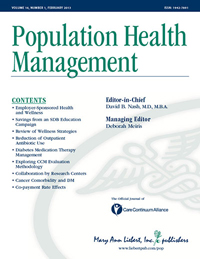Christiana Care study shows that free diabetes meds and supplies improve disease management

 Christiana Care Health System clinical research scholars coauthored a study published in the Feb. 13 issue of Population Health Management that found reducing barriers to medication access with a strategy known as value-based insurance design can improve medication adherence and management of chronic diseases such as diabetes.
Christiana Care Health System clinical research scholars coauthored a study published in the Feb. 13 issue of Population Health Management that found reducing barriers to medication access with a strategy known as value-based insurance design can improve medication adherence and management of chronic diseases such as diabetes.
Coauthors of the study were: Daniel Elliott, M.D., Christiana Care’s codirector for ambulatory medicine research and clinical outcomes and acting associate chair of research; Edmondo J. Robinson, M.D., MS, MBA, associate chief medical officer and physician-in-chief at Wilmington Hospital; and Karen B. Anthony, MS, program manager in the Department of Family & Community Medicine.
The study, “Patient-Centered Outcomes of a Value-Based Insurance Design Program for Patients with Diabetes,” analyzed the economic and patient-perceived benefits of eliminating co-payments for diabetes-related medications and supplies. It compared patient self-reports from before and one year after the start of a value-based insurance program for Christiana Care employees that eliminated insurance co-payments for diabetes-related medications and supplies. The program formed part of Christiana Care’s wellness efforts to improve employee health.
Value-based insurance design principles help align consumer incentives with the use of high-value services, offering an opportunity for quality improvement, cost savings and reductions in unnecessary and ineffective care.
“Our study shows the impact of value-based insurance design on patients,” said Dr. Elliott. “This program eliminated financial barriers, helped patients have better access to medications and supplies and, in general, they reported it helped them to take better care of their diabetes.”
As a group, the patients reported improved adherence to medication regimens for hyperglycemic control, a significant decrease in out-of-pocket costs, and a decrease in cost-related non-adherence. Nearly 90 percent of the study participants felt that the elimination of co-payments helped them better self-manage their diabetes.
“A high rate of patients in the study — 41 percent — reported that they limited the use of medication due to cost and 20 percent reported that they spent less on food and basic needs to pay for their medication,” adds Dr. Elliott.
“Improving care coordination is a cornerstone of health reform. That’s why this is a watershed paper,” said Editor-in-Chief David B. Nash, M.D., MBA, dean and Dr. Raymond C. and Doris N. Grandon Professor, Jefferson School of Population Health, Philadelphia, PA.